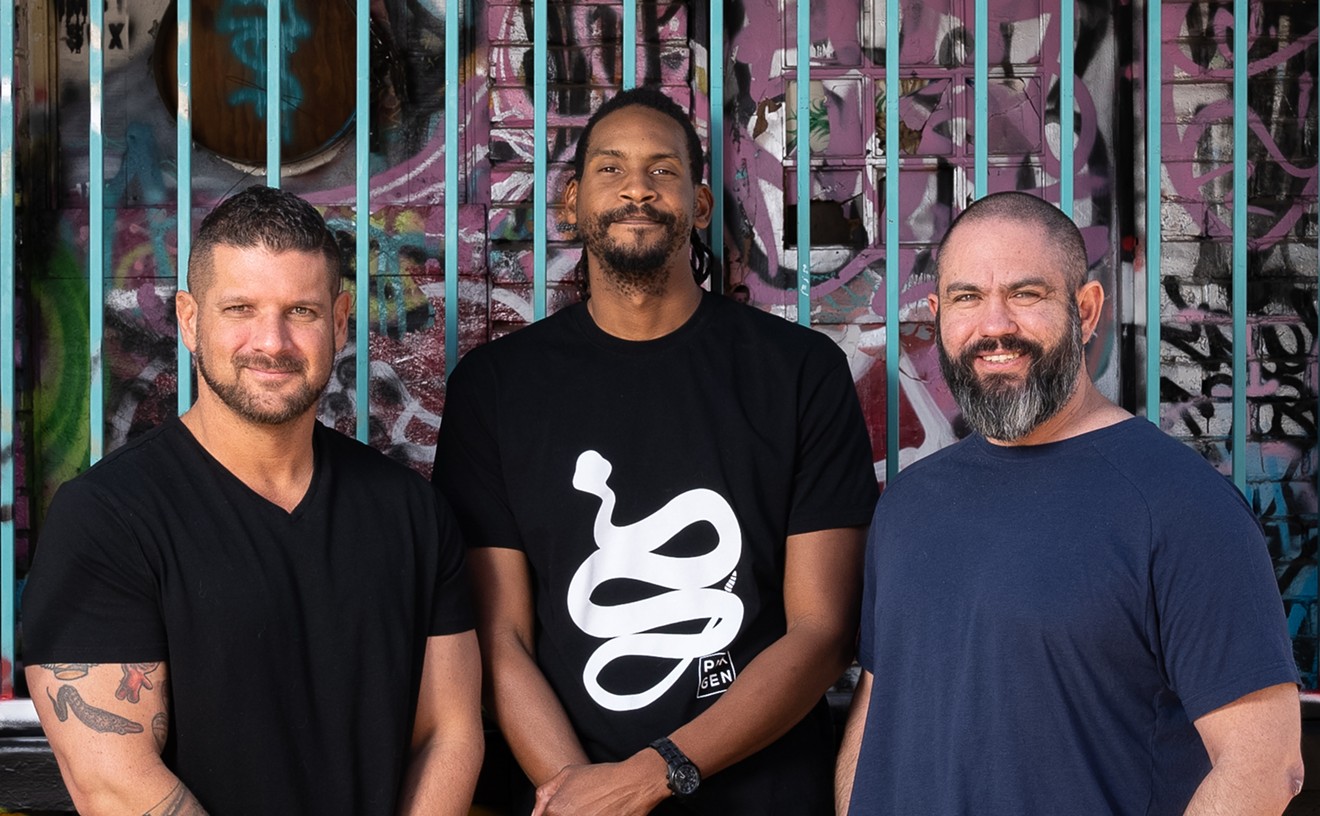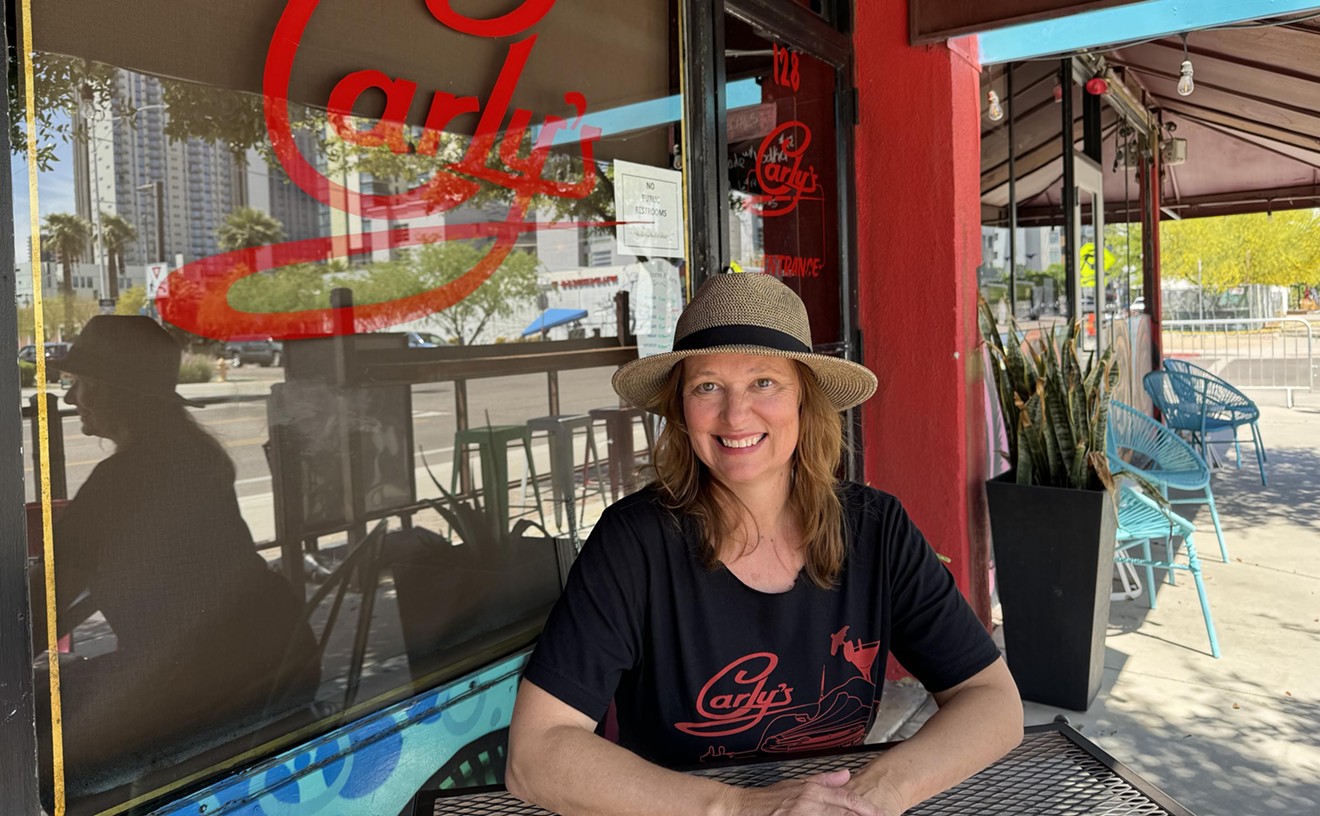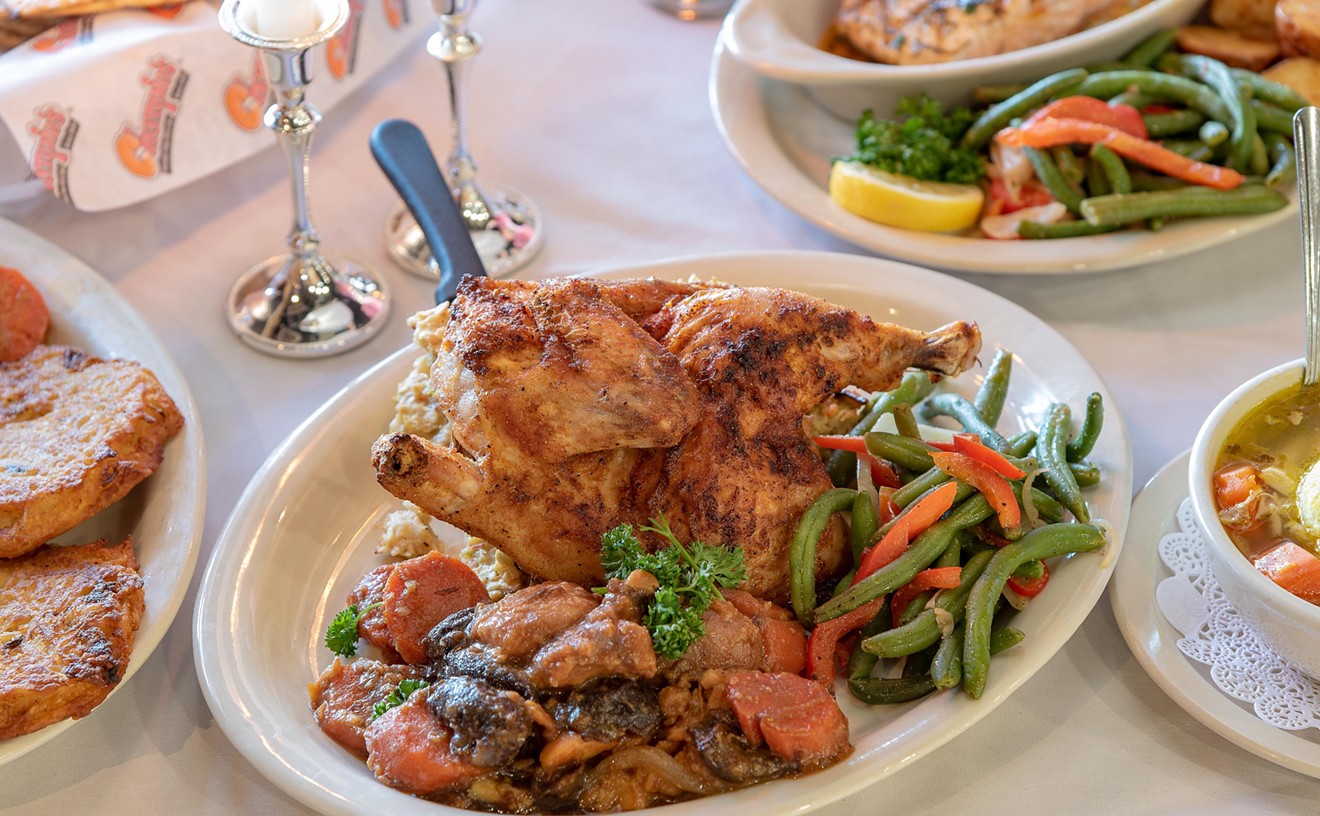I place the bowl of spaghetti on the table directly in front of my husband. Then I stand there for a moment and give him a dirty look, just like I do every time I make spaghetti.
"So," I say in a completely serious tone, "is this magic bowl of spaghetti sending you a message? Because if the pasta is trying to tell you something, I think we need to clear it up right now before I bring the meatballs out. Any messages from beyond? Or behind?"
And then I wait.
"I'd rather not talk about it," he usually says, which is the right answer.
I'm sure not everyone eats spaghetti like this, but it's become something of a custom in our house. The gravy is homemade: the meatballs are the result of generations of meat and cheese mashing until they are perfect. I'm a pro at making gravy now, but when I was in my 20s it wasn't such an easy task.
Although I'd been watching my nana make gravy since I was old enough to know that hot oil will pop into your eye if you stand too close to frying spheres of meat, it took a certain amount of chutzpah to take on the duty myself. One afternoon, I decided to give it a shot and followed my nana's directions, mapped out in her formal script on a stained recipe card.
I rolled the meatballs out perfectly, a precise combination of beef, pork, bread crumbs, garlic, and Parmesan. Nana's recipe. After frying them to a crispy deep brown, I plopped them into the gravy, which had been waiting patiently in a pot next to the frying pan.
From the aroma steaming up and the simmering sauce's popping bubbles, I could tell it was probably my best batch yet — my family's ages-old mainstay tomato sauce for all things Italian: lasagna, eggplant Parm, and most importantly, macaroni. My nana's gravy accumen left a lot to live up to. It takes hours to make, and the longer it simmers, the better it is. I left my gravy on all morning and thought that as long as I was going through the trouble for my own dinner, I might as well spread the glory of gravy around and put together a nice lunch for a guy I had just started dating.
Instead of eating off the roach coach, he would have an awesome dish of spaghetti and meatballs.
When the gravy was finished, I assembled the spaghetti and meatballs together in a Tupperware bowl and brought it to his place of employment, eager to deliver such a delicious lunch. He smiled when he took it, and said he would call me later that night. I waited in wild anticipation of what he would say. Italian girls have a lot to make up for; if you're not willing to have hot wax poured over 90 percent of your body, you'd better be exceptional in other areas. I was hoping gravy was mine.
And he did call when he said he would, then invited me over. He made no mention of the spaghetti, but as soon as I got to his house, his reaction couldn't have been more spectacular.
He broke up with me.
I tried to take it on the chin, but I sobbed to Stevie Nicks songs the whole way home, wailing like a cat on the 202 and then the 51. He said he wasn't ready for something so serious, not even when I insisted that macaroni was just macaroni and not an offering of a dowry. It was not a cow or a herd of goats. It was just lunch.
I'm sorry, he said. I'm not ready for the spaghetti level of relationship, he explained. Spaghetti added a lot of pressure. It was too soon; spaghetti was . . . more than he could do at the moment. Spaghetti was heavy.
I was stunned for days. Would it have been different with macaroni and cheese? Should I have delivered a burrito? After overthinking my misstep, I started to resent the spaghetti. I was never going to make it again. I told my nana what had happened, and she just laughed. "What a gavone," she said with a wave of her hand. "Spaghetti is just spaghetti! Now if you made gnocchi or brasiole, that's asking for a commitment."
I ran into him at the bar that weekend and instead of snubbing him, I addressed the issue head on.
"Hey, you," I said, drunkenly wagging a finger in his face. "That gravy wasn't just for you, you know. I was trying to be nice. Try to find another girl who makes it like I do. Never. Gonna. Happen. That's my nana's gravy, buster. And you've had it for the last time."
"It was delicious," he admitted.
Seventeen years later, I still think of that guy when I make gravy. I've gotten better at it, and now, after almost two decades of practice, I have it down to near-perfection. I feel almost sorry for him, but then I remember the snot bubble I blew near the Indian School exit and I just have to laugh at his foolishness. Jerk.
When I ask him if he sees anything in the magic spaghetti, he never has an answer. But my husband always eats every last bite.
Adventurous Eater | Eric Schaefer
Nearly 10 years ago, my wife and I had our second date at Hiro Sushi, an authentic Japanese restaurant in North Scottsdale that defies nearly all the Scottsdale stereotypes. It's low-key, no-frills, and has a very solid following among Japanese nationals. But unbeknownst to me, this was more than a date. It was a test.
Though my requirements for a wife were relatively simple — beyond the usual criteria, she had to eat red meat, know how to drive a standard transmission, and not get seasick — her requirements for a husband included me being an adventurous eater. And, at the time, her idea of "adventurous" meant ordering amaebi, which are raw shrimp served with the deep-fried heads as a crunchy accouterment. Without hesitation, I ate the shrimp and devoured the heads and, as they say, the rest was history. That was the easiest test I ever passed.
Fast-forward to a recent Friday night, when, not having made any dinner plans in advance, we decided to go to Hiro and take a seat at the all-too-familiar sushi bar. Except this time was different. Instead of our usual order, we just said "omakase" and let the chef do the rest. I said, confidently, "Bring out whatever's fresh, and we eat everything." Little did I know he took that as a challenge.
So we indulged in a Sapporo, had some sake, and waited. Our son's 7th birthday party had been earlier that day at Peter Piper Pizza, so we were happy to have some downtime and peace.
And then without fanfare, we were presented with two small bowls accompanied by an unintelligible Japanese description. Inside was a grayish lumpy liquid that looked like poi from Hawaii mixed with unidentifiable "parts." The only color was a sliver of yellow from a delicate slice of lemon on top. Without much hesitation I scooped some up with my chopsticks and put it into my mouth.
All at once, my palate was hit with what can best be described as "the flavor of death."
Ammonia, bile, vomit and the distinct flavor of salty decomposition. I swallowed but knew that I was mortally wounded. I turned to my wife and said, in a quiet voice, "This isn't good" — an unintended double entendre referring not just to the food, but to my physical state. She took a bite and — shockingly — took a second bite before turning to me, expressionless, proclaiming, "I can't eat this."
Imagine a rotting dead sea monster, thrown in a blender, poured into a bowl, and then left to rot some more and served with a lemon slice. Then imagine someone eating it and throwing it up — into your mouth. That's what I tasted.
Except we're too damn polite. We didn't want to offend the chef, who was clearly pleased to serve us this delicacy and took seriously my claim that "we eat everything." He wanted to please us. We knew that he would be sad if we returned it to him, mostly untouched. Eating it was categorically out of the question. Yet we were also taking a chance that if he thought we loved it, he'd continue to push the culinary envelope with each subsequent course.
Given the circumstances — and the fact that the color in my face was quickly going from "pale Jew" to "Shrek" — it was a chance worth taking. My wife stealthily handed me a plastic cup that was still in her purse, a cup used to hold video game tokens at our son's party earlier in the day. I quietly put the cup under the counter and poured out the contents of the two small bowls into the cup. My wife took it to the bathroom and threw it away.
My wife described it perfectly: "pourable, vomit-flavored fish guts."
Toward the end of our meal, I asked the chef what it was. His response: "Squid guts, served raw and cold, salted, and left overnight. I thought you would like it since you were drinking. Did you like it?"
My response: "It was . . . challenging." I can only hope that he thought we ate it and that it enhances our Japanese food street cred. I also hope he doesn't read Chow Bella.
Sadly, the night couldn't be salvaged for me. Though the rest of the food was delightfully perfect — as it almost always is at Hiro Sushi — I had suffered a blow from which I could not easily recover. Each subsequent course was a challenge, and my mind was completely fixated on whatever it was that we had been served at the beginning.
On our way home, we stopped at the grocery store and picked up a few pints of Ben & Jerry's to cleanse our palates. Even Chunky Monkey did little to quell the lingering taste of death. And as I write this — two days after the incident — my mouth still suffers from pre-puke excessive salivation each time I think of the flavor. Yet, in hindsight, it was something of an intimate moment in what I can only surmise is similar to the way in which survivors are brought closer together by a traumatic event. We suffered through this. We survived. We can survive anything!
After some research, I learned that we were served shiokara. According to Wikipedia, shiokara is "considered something of an acquired taste even for the native Japanese palate. One method of enjoying it is to consume the serving at one gulp and to follow it with a shot of straight whiskey."
I wish we had been offered the whiskey.
The moral of the story: Be very careful when you say, "I eat everything." Death pairs well with whiskey. And if death is on the menu, eat it with someone you love.
Relish Tray | Kim Porter
My sister approaches me with her baby on her hip. "Me and the kids have to go," she whispers, "I think there's about to be drugs."
We're at our father's wake. "What makes you say that?"
"I just heard that woman tell that woman that someone named Susan was bringing a relish tray." She gestures discreetly to Kathleen and Janet, who stand in the kitchen grazing at the buffet table. "And the second woman said, 'Thank, God, I was hoping somebody would bring a relish tray. I love a relish tray.' And the first woman said, 'Me, too. I just love a relish tray!' And then they laughed."
I look around at the guests. I wouldn't be surprised if someone fired up a doobie. I sniff the air.
My father was a lifelong drug user. According to legend, the first time he ever took drugs was in elementary school and the last time was Monday, the day before his sudden fatal heart attack, when he dropped acid during Frisbee golf. Almost everyone at the wake is a person who has partied with him at one time or another, including me. My father's favorite high was marijuana. He smoked pot the way other people visit the restroom: routinely and without fanfare.
"A relish tray?" I'm not sure I heard her right.
"Isn't that a drug term?" My older sister is an exceptionally principled person with a sharp, analytical mind who, unlike me, chose early on to protect herself from the unsavory aspects of our father's life. For my sister, visiting my dad's house, being among his friends, must be like visiting a foreign country where she doesn't know the vernacular.
"I've never heard drugs referred to as a relish tray," I say. I'm tempted to laugh, but I don't because it would be mean and because the more I think on it, the more "relish tray" does sound like a plausible euphemism for drugs.
"It's just got to be drugs," my sister says, "Nobody could love pickles that much! It's unnatural."
When I was a child, we endured a period of poverty, during which food was scarce. This feeling of scarcity colored my whole relationship to food: how much I ate, how fast I ate, and how indignant I was that others were getting my share. The foods that showed up only once a year (holiday foods, for instance) were welcomed back to my plate like old friends who'd been cruelly kept from me.
We had a relish tray one day a year: Thanksgiving. Our tray contained pickles with folkloric-sounding names like gherkins and midgets, smooth bread-and-butter pickles that squeaked when you bit them, and "stuffed" celeries that fanned around the plate slowly sloughing off their cheeses. In the middle lay the olives.
Green olives are a perfect food, save for that off-putting red matter in their core. But I didn't have the luxury to be squeamish about the pimiento, as the competition for the olives was fierce.
My sisters and I would squabble about who was the bigger hog as we stuffed ourselves, eventually settling into a truce during which we took turns declaring our allegiances to this year's favorite pickle.
When the green olives were dispatched, I'd move on to the black ones. Licking the metallic juice off my hand, I would jam an olive on my thumb and pretend I was a carpenter who had injured myself with a hammer.
As we got older, we were put in charge of fishing the olives from their jars. Some of the allure wore off when I discovered that pimientos could break free from their host olive and float around in the brine, and if you weren't careful, they would touch you. Still, I loved the relish tray. But, when my older sisters moved away from home, and there was no one to gorge or compete with, I lost my zeal. The relish tray became just one more dish to wash.
(Eventually, I will have kids of my own and I will be excited to revive the beloved tradition. But, sadly, my children won't care for the relish tray. I'll realize, once and for all, that if I have no one to share it with, what's the point? If I want a gherkin, I can get a gherkin, and I find I rarely do. Turns out, it wasn't the pickles I relished.)
At the wake, I tell my sister, "If anybody does drugs, I'll stop them."
"I don't want to be trouble. I should just go."
I can feel her pain.
On the one hand, she has zero desire to expose herself or her kids to drugs. On the other hand, "goody two shoes" is an unkind label that's been foisted on her all her life by our dad, and I'm sure she isn't eager to be seen that way just now.
But, I don't want her to go. I haven't seen her in years. And as sad as this last week of funeral preparations has been, we've had phenomenally good laughs. We've made new memories. My sister is hilarious and dependable, and I am savoring every second.
"I'll take care of it," I assure her.
She's not convinced, but she agrees and wanders off to locate her kids while I make my way to my father's closest friends to see if I can get their help spreading the message of "don't fire up."
A few minutes later, my sister calls me softly from the kitchen.
"Kim, may I speak to you?" her voice is edgy and her expression too intense. I enter the kitchen and see her standing by the buffet table next to Susan. My sister gestures like a game show hostess toward a platter of pickles and olives. "Look, Susan brought a relish tray," she says, trying not to laugh. "Wasn't that nice?"
"Thank God!" I say, making my way toward the table, toward my sister. "I was hoping someone would bring a relish tray."
"Me, too," my sister says. "I just love a relish tray."










